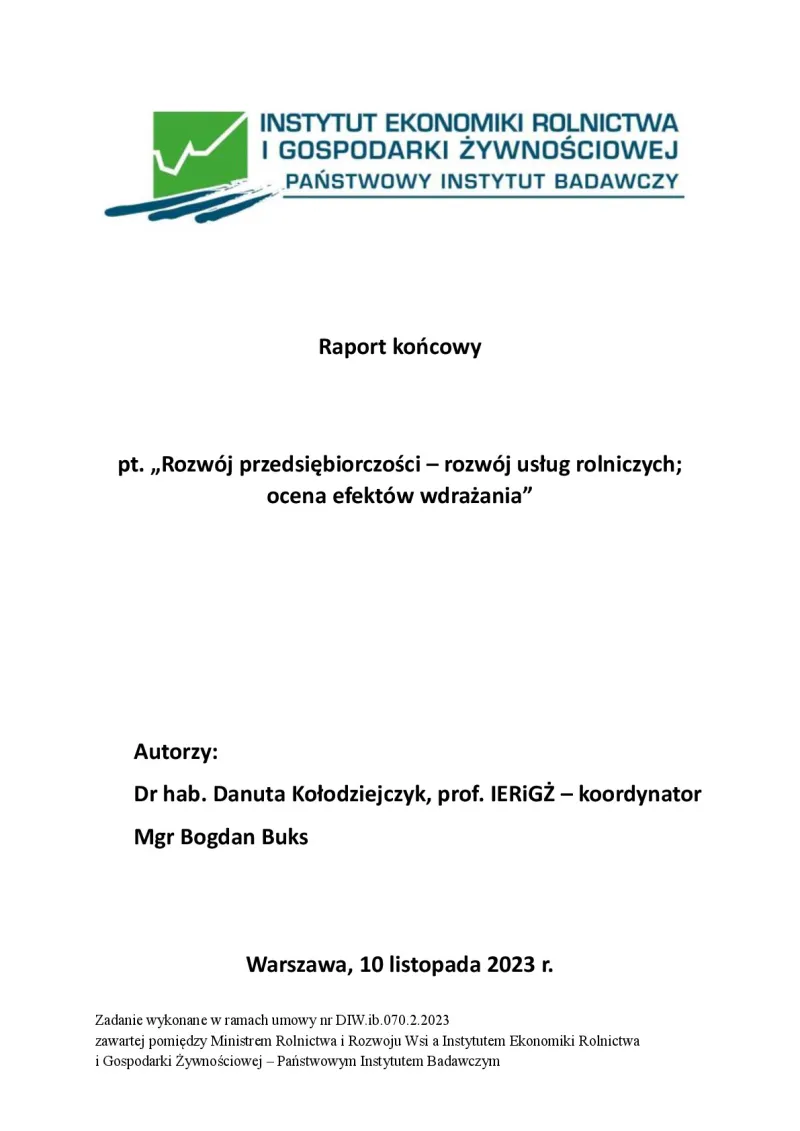Development of entrepreneurship and agricultural services
This report examines the effects of the operation ‘Development of entrepreneurship and of agricultural services’ through indicators, support seeker characteristics and activities in rural entrepreneurship.
- Poland
- 2014-2022
- Environmental impacts

This evaluation focuses on assessing CAP Objective 1, which emphasises viable food production, particularly concerning support directed towards the development of agricultural services. The geographical coverage of this evaluation encompasses the entire country of Poland.
The primary aim of this evaluation is to assess the effects of implementing the operation titled 'Development of Entrepreneurship - Development of Agricultural Services'. Additionally, this evaluation provides a strategic analysis of support for the forthcoming years based on monitoring indicators.
This evaluation addresses several key questions:
- Is the way beneficiaries and the target group are defined, along with the scope or conditions of assistance, access criteria, methods of selecting operations and budget assumptions, consistent with the objectives stated in the 2014-2020 RDP?
- Does the public aid provided, both in terms of subject matter and quantity, correspond to the needs of the beneficiaries?
- To what extent do the contracted projects ensure the achievement of the results outlined in the programme?
The evaluation applies the criteria of relevance, effectiveness and efficiency.
This evaluation employs a quantitative method that analyses the level of indicators. The primary data sources include individual and aggregated data obtained from the Paying Agency. This data encompasses the following:
- Information on individual applicants who have been awarded funding, detailing the planned types of investment for crop production, livestock production and post-harvest services by municipality and province.
- Data for contracts for which the final payment has been made, organised by commune and province.
- Data for contracts for which information was submitted following the operation's implementation, including gross added value, the number of producers and the number of post-harvest services rendered, also organised by commune and province.
The main indicators used in this evaluation include financial indicators, such as gross value added and final payments made, as well as an output indicator reflecting the number of agricultural entrepreneurs who have benefited from agricultural services, and the number of services provided by beneficiaries.
The definition of beneficiaries was clear and did not raise any doubts regarding which entities could receive funding. However, the application of the same provisions and requirements for micro and small enterprises raises concerns, given their different operational contexts. Due to the significant variation in entrepreneurial development in rural areas, it is crucial to provide additional support to beneficiaries who are initiating agricultural services, particularly those residing in the areas where the services will be offered.
The project selection criteria, aimed at achieving the specific and cross-cutting objectives outlined in the 2014-2020 RDP, were factually and logically sound. The substantive and logical correctness of these criteria primarily focused on completeness and proportionality. The range of eligible costs received a positive assessment, as they were appropriately aligned with the operation. Investment costs associated with innovation and environmental protection were included, fostering the development of modern agricultural services and ultimately facilitating farms' access to new technologies.
Given the positive impact of this operation on rural development and the significant interest from potential beneficiaries, the distribution of funds for this operation, with only a national limit set, appears to be inadequate. The implementation of this operation is expected to enhance the economic performance of entities, including farms, not only for those receiving direct support but also for those utilising their services. This outcome should be viewed as a direct effect, while the indirect effects include improved working conditions and safety for farmers, as well as the potential transition to organic production.
The indicators derived from both the analysis of beneficiary achievements and the financial situation of beneficiaries do not raise concerns regarding the continuation of this operation. Producers have fully accepted the directions of support for agricultural services as appropriate.
Author(s)
Dr hab. Danuta Kołodziejczyk, koordynator Mgr Bogdan Buks (Instytut Ekonomiki Rolnictwa i Gospodarki Żywnościowej – Państwow Instytut Badawczy)